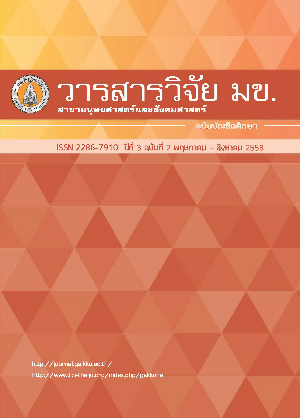การพัฒนาหน่วยการเรียนรู้บูรณาการแบบ STEAM สำหรับนักเรียนชั้นมัธยมศึกษาปีที่ 3 : กรณีศึกษา ชุมชนวังตะกอ จังหวัดชุมพร (The Development of Steam Integrated Learning Unit for Ninth Grade Students : Case Study at Wangtako Community in Chumphon Province)
คำสำคัญ:
หน่วยการเรียนรู้ (Learning unit), บูรณาการแบบ STEAM (STEAM), ชุมชนวังตะกอ (Wangtako community)บทคัดย่อ
บทคัดย่อ
การวิจัยมีวัตถุประสงค์เพื่อ 1) พัฒนาหน่วยการเรียนรู้บูรณาการแบบ STEAM 2) ศึกษาผลสัมฤทธิ์ทางการเรียนจิตสำนึกอนุรักษ์สิ่งแวดล้อม และความพึงพอใจของนักเรียน 3) ศึกษาประสิทธิภาพของหน่วยการเรียนรู้ แบบแผนการวิจัย คือ One-Group Pretest-Posttest Design กลุ่มเป้าหมาย คือ นักเรียนชั้นมัธยมศึกษาปีที่ 3 ปีการศึกษา 2557 โรงเรียนเมืองหลังสวน จำนวน 33 คน เครื่องมือที่ใช้ คือ 1) แบบทดสอบผลสัมฤทธิ์ทางการเรียน 2) แบบวัดจิตสำนึกอนุรักษ์สิ่งแวดล้อม 3) แบบสอบถามความพึงพอใจของนักเรียน ผลการวิจัยพบว่า 1) ผลสัมฤทธิ์ทางการเรียนหลังเรียนสูงกว่าก่อนเรียน และผ่านเกณฑ์ที่กำหนด (ร้อยละ 65) อย่างมีนัยสำคัญทางสถิติที่ระดับ .05 2) จิตสำนึกอนุรักษ์สิ่งแวดล้อมหลังเรียนสูงกว่าก่อนเรียน และนักเรียนมีความพึงพอใจต่อการจัดการเรียนรู้ ผ่านเกณฑ์ระดับดี (เฉลี่ย 3.51) อย่างมีนัยสำคัญทางสถิติที่ระดับ .01 3) หน่วยการเรียนรู้มีประสิทธิภาพ 81.65/78.33 ตามเกณฑ์ 80/80
ABSTRACT
The purposes of this study were: 1) to development of STEAM integrated learning unit 2) to study the achievement, conscious of environmental conservation and satisfaction of the students often learning by using STEAM integrated learning unit 3) to study efficiency of learning unit. The design of this study was One-Group Pretest-Posttest Design. The sample consisted of 33 ninth grade students of the 2014 academic year at Muanglangsuan school. These research instruments were: 1) achievement test 2) conscious of environmental conservation test 3) satisfaction for students questionnaire. The results were as follow 1) the post-learning achievement of the students were higher than the pre-learning counterpart achievement and passed level of the criterion(percent 65) at the .05 level of significance. 2) the post-learning conscious of environmental conservation of the students were higher than the pre-learning counterpart conscious and satisfaction for learning management which was good level(mean=3.51) at the .01 level of significance. 3) the learning unit were effective at 81.65/78.33 in accordance to 80/80




